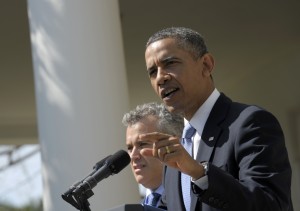Many of President Obama’s proposed reforms, such as immigration reform and “Preschool for all,” have been put into official monetary value with the release of the 2014 budget plan.

On the White House homepage, it said the budget is designed to “make critical investments to strengthen the middle class, create jobs, and grow the economy while continuing to cut the deficit in a balanced way.”
President Obama has proposed many ways to grow the economy, such as raising the minimum wage to $9 per hour and investing in high-tech manufacturing jobs. His proposal even includes a plan to better the high school experience and help students prepare for careers after high school.
A press release from the White House quoted U.S. Secretary of Education Arne Dunn, who said education is one of President Obama’s top priorities.
“We must continue to build on the reforms already transforming classrooms across the country,” said U.S. Secretary of Education Arne Duncan. “Strategic investments in our educational system will not only provide more opportunities for millions of Americans, but they will strengthen our nation’s workforce as well.”
President Obama said there will not be anything added to the federal debt to help fund these reforms. A Bloomberg article stated these plans include placing more taxes on the wealthy to alleviate the deficit. And some more unique taxes are helping as well. A Washington Post article said an increased tax on cigarettes, raising the federal tax from $1.01 per pack to $1.95 per pack to pay for the universal preschool proposal.
The budget proposals will replace the sequester cuts and contribute to $1.8 trillion in additional deficit reduction over 10 years.
The proposed budget is drawing criticism from both the left and right, particularly because the budget proposal is two months late. The Senate and House have each passed separate and very different 2014 budget frameworks already, and the president’s proposal isn’t expected to last long on Capitol Hill.
A chief concern with the proposal stems from proposed cuts in other federal programs. Meals on Wheels and other nutrition programs for seniors may be cut or completely frozen. The funding for Aging and Disability Resource Centers can be cut from $16 million to $10 million.
House Democrats voiced their disapproval; 107 House Democrats signed a letter declaring their “vigorous opposition to cutting Social Security, Medicare or Medicaid benefits.”
The GOP Senate Budget Committee staff also found that each American household’s share of the federal deficit will jump from $133,000 to $189,000 in the next decade if the 2014 budget plan goes forward.
A Washington Post editorial suggested President Obama’s plan may not fully recognize the nation’s problems.
In short, neither Mr. Obama’s plan nor the GOP’s fully comes to grips with the hard choices facing the country. That task may have to await new leaders.
His proposal is now being reviewed by Congress.




